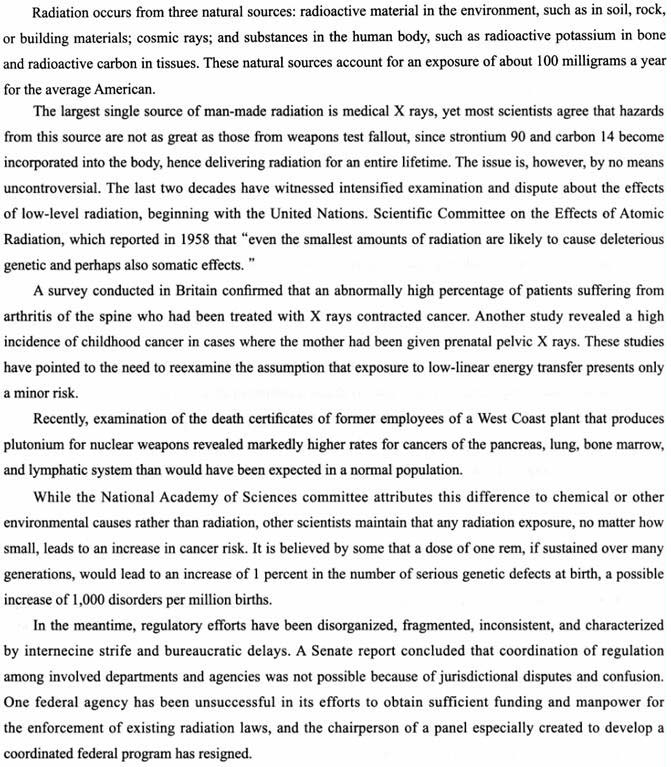The dormitory can only ________ four students.(A) accommodate(B) accompany(C) accomplish(D) recommend
题目
(A) accommodate
(B) accompany
(C) accomplish
(D) recommend
相似考题
更多“The dormitory can only ________ four students. ”相关问题
-
第1题:
下列语句能给数组赋值而不使用for循环的是
A.myArray{[1]="One";[2]="Two";[3]="Three";}
B.String s[5]=new String[]{"Zero", "One", "Two", "There", "Four"};
C.String s[]=new String[]{"Zero", "One", "Two", "There", "Four"};
D.String s[]=new String[]=|"Zero", "One", "Two", "There", "Four"};
正确答案:C
解析:A)、D)语法不正确,B)中s[5]的形式只能通过for循环的格式进行赋值,而不能直接赋值。C)中表达式左侧的“[]”说明现在定义一个数组,不需要指明数组长度,而表达式右侧“[]”在后面直接紧跟初始内容时也是不需要指定数组大小的,数组大小直接由初值长度决定。 -
第2题:
YouwanttocreateanRMANrecoverycatalogintheRC01databasetohelpyoumanagethedatabasesnamedDB01andDB02.Youneedtocreatearecoverycatalogownerinwhichofyourdatabases?()A.RCO1only.
B.DB01only.
C.DB02only.
D.DB01andDB02only.
E.DB01,DB02,andRC01.
参考答案:A
-
第3题:

Which of the following does the author cite in support of the quotation from the United Nations Scientific Committee on the Effects of Atomic Radiation?( )Ⅰ.Strontium 90 and carbon 14 become incorporated into the body and deliver radiation for an entire lifetime.Ⅱ.An abnormally high percentage of patients with arthritis of the spine who were treated with X rays contracted cancer.Ⅲ.A high incidence of cancer appeared among children of mothers who had been given prenatal pelvic X rays.A.Ⅰ only.
B.Ⅰ,Ⅱ,and Ⅲ.
C.Ⅰ and Ⅱ only.
D.Ⅱand Ⅲ only.答案:D解析:细节题。根据题干关键词United Nations Scientific Committee on the Effects ofAtomic Radiation可定位到第三段。这段列举了Ⅱ和Ⅲ两个例子,D项正确。 -
第4题:
下列语句能给数组赋值,而不使用for循环的是
A.myArray{[1]="One";[2]="Two";[3]="Three";}
B.String s[5]=new String[] {"Zero","One","Two","Three","Four"};
C.String s[]=new String[] {"Zero","One","Two","Three","Four"};
D.String s[]=new String[]= {"Zero","One","Two","Three","Four"};
正确答案:C
解析:字符串数组赋初值的方法有两种,一种是如选项C一样初始化。另外一种是先为每个数组元素分配引用空间,再为每个数组元素分配空间并赋初值。例如还可做如下赋值:
string s[]=new String[5];
s[0]="Zero";
s[1]="One";
s[2]="Two";
s[3]="Three";
s[4]="Four"; -
第5题:
---- Look! The man at the gate ________ be our headmaster. He is always standing there every morning.
--- - No, it ________ be him. He is holding a meeting in the office now.
A.must, can’t B.must, mustn’t C.can’t, can’t D.can’t, mustn’t
正确答案:A
-
第6题:
下列给字符串二维数组进行赋值的语句中,错误的是()。
A.String s[ ] [ ] = new String [ ] [ ] { { “One “ , “ Two “ }, { “ Three “ , “ Four “ } } ;
B.String s[ ] [ ] = { { “ One “ , “Two “},{ “ Three “ , “ Four “ } } ;
C.String s[ ] [ ] = new String [ ] [ ] { { “Zero”} , { “ One ” , “Two” , “ Three” , “ Four” } } ;
D.String s[ 2] [2 ] = { { “ One ” , “Two”},{“ Three” , “ Four” } } ;
String s[ 2] [2 ] = { { “ One ” , “Two”},{“ Three” , “ Four” } } ;
